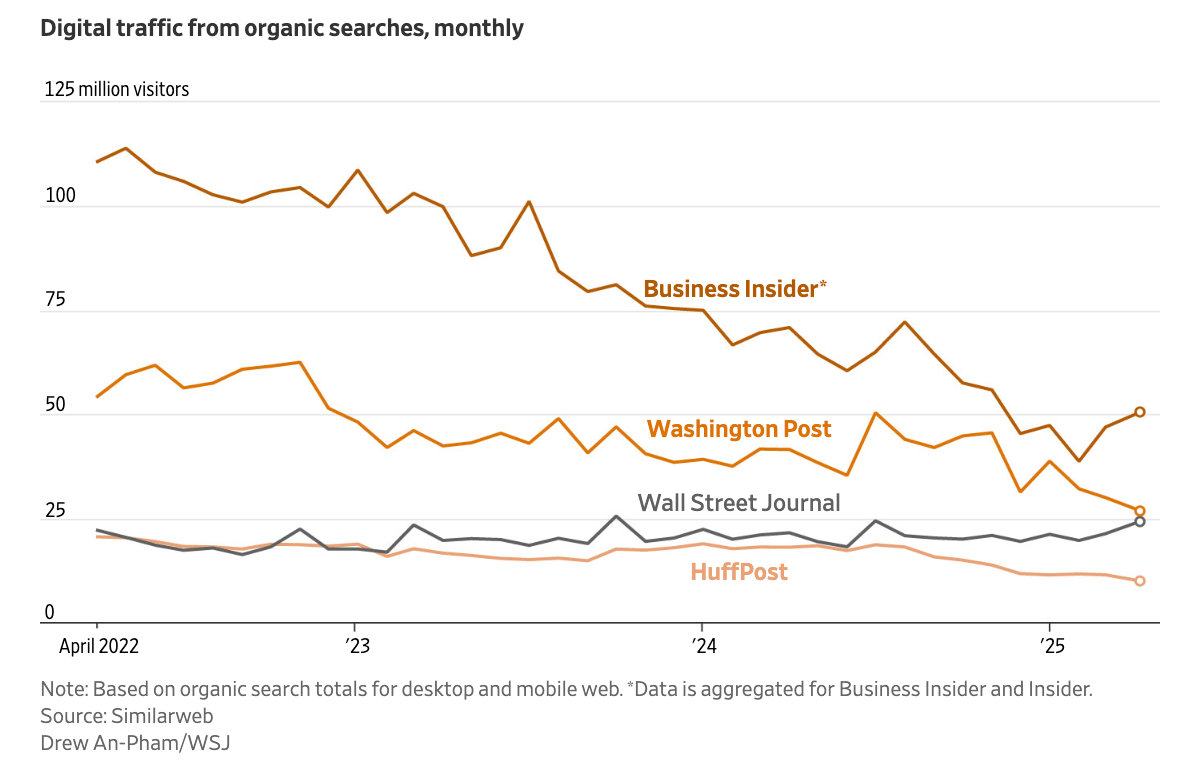- MediaMorph
- Posts
- MediaMorph Edition 56 - by HANA News
MediaMorph Edition 56 - by HANA News
Apocalypse now?
MediaMorph Edition 56 - by HANA News
Apocalypse now?
Was this newsletter forwarded to you? Sign up here
The written-by-a-human bit
The piece that got hares running this week was the summary by The Wall Street Journal - News Sites Are Getting Crushed by Google’s New AI Tools, with the uncharacteristically apocalyptic subheading, The AI armageddon is here for online news publishers. There is a clear correlation, if not complete causation, between a significant traffic drop in organic Google search traffic for some publishers and the rise of AI-generated summaries and chatbot answers.

Source - SimilarWeb via WSJ
Bear in mind, this is before the rollout of Google AI Mode in Search (not yet available in the UK), which mimics a Perplexity/ChatGPT-style results page. Goodbye prominent blue links, hello tiny citations.
As ever, publishers which already have solid direct subscriber relationships with their user base are best positioned to weather the storm. Pity the mid-tier, digital-first, ad-driven sites like Business Insider.
Execs are finally smashing the emergency glass “in case of fire” box.

What to do? Apart from “don’t panic”, here are some current strategies being explored in on the media Kubler-Ross trauma curve:
Denial: Do nothing and wait for the glory days of free traffic to come back via some form of new SEO called GEO (Generative Engine Optimisation) – no one has cracked this yet, although some research hints at how AI engines graze for high-quality forum threads.
Anger: Sue, fight through the courts, lobby for regulation and intervention.
Bargaining: Cut a deal with the AI engines and seek fair compensation.
Acceptance: Accept that organic search traffic is a thing of the past and follow the data – understand who finds your content from AI summaries and double down (see Building resilient content strategies for publishers with David Buttle and Will Barker on MediaCopilot).
Action: Cut costs – AI is your friend (just don’t celebrate the fact in some crass press release about how clever you are being AI-first and reducing headcount). Build direct relations with your “members” – newsletters and events are a good start. Build your own “Perplexity-style” custom AI-search interface.
If it is any consolation, this is not just a media problem. The street will be watching Google’s next quarterlies like hawks to see how much they are cannibalising themselves.
DEFCON 4 - This is a re-wiring of the entire internet.
Mark Riley, CEO Mathison AI
p.s. did you or your org make the “Who to follow: 75 expert voices at the intersection of AI and journalism” by journalism.co.uk?
Hi
AI will be a substantial competitive advantage for those who master it. But most are still struggling with adoption because rolling out a chatbot or copilot isn’t enough to get people using it.
At Mathison AI, we are helping CEOs like you rapidly discover and prototype high-impact AI use cases tailored to your business.
We’re currently working with global and local media companies to identify areas where AI can drive real operational value — from automation and cost savings to entirely new product ideas.
If you’re exploring AI and want a clear, low-risk way to get started, we would love to share how we approach it through fast education sessions and hands-on prototyping.
AI and Media and Journalism
News Sites Are Getting Crushed by Google’s New AI Tools WSJ The rise of AI-driven chatbots is significantly reshaping information consumption, drawing users away from traditional search engines like Google and leading to a decline in web traffic for publishers. To survive this shift, publishers must adapt by creating content that integrates with chatbot platforms and enhances user interaction. |
Google's AI Is Actively Destroying the News Media Futurism - June 13, 2025 Google's shift to AI-powered search tools is drastically reducing traffic for digital news publishers, with outlets like Business Insider facing a 55% decline in visitors. As smaller publications struggle for visibility and revenue, legal challenges against Google's content scraping practices are on the rise, highlighting a critical battle for fair compensation in the evolving media landscape. |
AI is giving local news a second chance. Will it be ready this time? Journalism professor Tom Rosenstiel highlights the importance of integrating user-friendly AI tools in newsrooms, emphasizing that they should enhance journalistic practices while avoiding sensationalism and misinformation. By prioritizing accuracy and audience engagement, he believes AI can strengthen storytelling and foster trust between journalists and their communities. |

How Should Journalists Call Out Lies in the Age of Trump and AI? CJR Stay informed with The Media Today, a daily newsletter from the Columbia Journalism Review, which highlights the vital role of journalists in navigating misinformation and rapid news cycles. Subscribe for insights on media practices, industry trends, and the challenges that shape today's journalism landscape. |

Who to follow: 75 expert voices at the intersection of AI and journalism Journalism - June 13, 2025 Join our upcoming media community to stay informed about the transformative impact of artificial intelligence in journalism. With insights from leading experts like Gina Chua, Phoebe Connelly, and Mike Reilley, we’re exploring innovative strategies to navigate the evolving landscape of newsrooms. |
In the age of AI, human emotion is journalism’s superpower Editor and Publisher - June 9, 2025 Philip DeFranco is reshaping journalism by connecting with Gen Z and millennials through his relatable, casual YouTube news delivery, contrasting with traditional anchors like Tom Brokaw. His success highlights the importance of blending authenticity with professionalism to engage younger audiences and rebuild trust in media. |

Who’s suing AI and who’s signing: Raft of Pro-rata partnerships, New York Times signs with Amazon Press Gazette - June 12, 2025 As the battle over content rights intensifies, major news publishers like The New York Times and Ziff Davis are taking legal action against AI companies like OpenAI for unauthorised use of their material. In contrast, others seek licensing agreements to ensure fair compensation. Amidst ongoing negotiations, partnerships are forming between AI firms and various media organisations, highlighting the need for structured licensing in the evolving landscape of journalism and AI technology. |

The Newspaper That Hired ChatGPT The Atlantic - June 13, 2025 Il Foglio, an Italian newspaper, is pioneering the integration of AI in journalism with its daily insert, Il Foglio AI, featuring ChatGPT-generated articles that are reviewed by human editors. Editor Claudio Cerasa emphasizes AI's potential to enhance writing while cautioning against using it as a cost-cutting tool, advocating for a collaborative approach between human journalists and AI technology. The publication’s early efforts in this space attracted ridicule in some quarters. |
User-Generated Content, Tariffs And AI Will Reshape The Ad Market, Says WPP Media In 2025, marketers face significant uncertainties in advertising spending, driven by shifting consumer behaviors and economic conditions. This volatility underscores the need for agility and data-driven strategies as companies navigate a rapidly evolving landscape. |
Artificial intelligence is getting tougher to spot in Kentucky: Media studies expert helps tell the difference As AI technology rapidly evolves, the media sector faces challenges in distinguishing between human and AI-generated content, raising concerns about authenticity and misinformation. Media organisations must adapt their standards to maintain credibility while embracing the efficiency and innovation that AI offers. |
Ed: Why AI Companies Should Pay Media Organisations for Their Content AfroTech - The New York Times has signed a multi-year licensing deal with Amazon, allowing the tech giant to use its content for AI models while ensuring compensation for intellectual property. This shift reflects a growing trend among news organizations to protect their rights and advocate for fair remuneration as AI technology continues to evolve. |

MSNBC’s Chris Hayes Told Me AI Will Radically Change Social Media. Here’s How Forbes - June 14, 2025 Social media is shifting from merely capturing attention to sustaining it, with experts like Chris Hayes predicting AI's role in tailoring engaging content that rivals streaming services. As users spend over two hours daily on these platforms, the challenge of distinguishing between human and AI-generated material grows, highlighting the need for self-awareness to navigate online distractions effectively. |

At Banff, Media Leaders Debate AI as Job Killer The Hollywood Reporter - June 9, 2025 At the Banff World Media Festival, industry leaders like Bing Chen of Gold House and Kevin Johnson of WPP Media Canada debated the impact of AI on jobs in entertainment, with Chen warning about potential job losses for young workers while Johnson maintained that AI could create new opportunities. The panel also addressed economic challenges in the media landscape, urging content creators to innovate and collaborate amid uncertainties around streaming and advertising trends. |
Six Five Media to Kick Off 2025 "Six Five Summit: AI Unleashed" Aiming to Explore the Future of Artificial Intelligence GlobeNewswire News Room - June 11, 2025 Join industry leaders at the virtual Six Five Summit: AI Unleashed 2025 from June 16-19, 2025, for four days of exclusive insights into the transformative power of artificial intelligence across various sectors, featuring a keynote from Michael Dell and discussions on key topics such as Cybersecurity and Cloud Infrastructure. Don't miss this opportunity to explore the future of technology innovation and network with top executives in the field! |
AI Overviews Slash News Traffic, Threaten Journalism WebProNews - June 11, 2025 The rise of AI-powered tools in online search, particularly by Google, is revolutionising user experience while jeopardising news publishers' traffic and revenue, leading to calls for regulatory intervention. As publishers face significant challenges, they are seeking alternative strategies to adapt, highlighting the critical need to balance technological advancement with the sustainability of quality journalism. |
Disinformation and Misinformation Are Top Concerns in Journalism, According to a New Muck Rack Report Cbs4indy - A recent report from Miami reveals that over one-third of journalists view disinformation and misinformation as the top challenges facing the media today, highlighting the urgent need to combat false narratives and restore public trust in journalism. As misleading information spreads rapidly through social media, maintaining credibility and delivering accurate news has become increasingly critical for the future of the industry. |

Hey ChatGPT, Which One of These Is the Real Sam Altman? Nytimes - Two journalists explore the duality of OpenAI's co-founder, with one highlighting their visionary commitment to ethical AI for societal benefit, while the other critiques the commercialisation of AI and its ethical implications. Together, these contrasting perspectives reveal the complexities surrounding the figure at the forefront of artificial intelligence innovation. |
Cronkite School welcomes new Professor of Practice in AI and Investigative Journalism Walter Cronkite School of Journalism and Mass Communication - June 11, 2025 The Walter Cronkite School of Journalism and Mass Communication has appointed Shelby Grossman as its inaugural Professor of Practice in AI and Investigative Journalism, backed by a $1 million grant from the Scripps Howard Foundation. This initiative aims to enhance journalism through AI education, supporting a professional certificate program and various student initiatives at the school’s Howard Center for Investigative Journalism. Read more at Walter Cronkite School of Journalism and Mass Communication (2 mins) |
AI and Academic Publishing

How Language Bias Persists in Scientific Publishing Despite AI Tools Stanford - A study by Haley Lepp and Daniel Scott Smith from Stanford reveals persistent biases against non-native English speakers in scientific publishing, where reviewers often equate language proficiency with research quality. Despite the potential of large language models (LLMs) like ChatGPT to assist authors, these biases remain largely unchanged, underscoring the need for a cultural shift towards more equitable and inclusive scientific communication that values diverse perspectives. |
Academic Publishers Sign AI Deals as Trump Cuts Research Funding Academic publishers are increasingly partnering with AI companies to monetize their extensive collections of scholarly content, tapping into the rising demand for access to academic resources. This collaboration not only offers financial benefits but also transforms how research and education leverage cutting-edge technology. |

How to make AI models more accurate: Embrace failure IBM Research - June 13, 2025 A recent study by IBM Research reveals that incorporating negative results from chemical experiments significantly enhances AI model training, improving predictions of chemical reactions. By leveraging data from both successful and unsuccessful experiments, researchers demonstrated that learning from failures can refine models' understanding of complex chemistry, outperforming traditional approaches and highlighting the need for better recognition of negative outcomes in academic publishing. |

Publishing deals are ‘unsustainable’, warn northern universities Times Higher Education (THE) - June 12, 2025 The N8 Research Partnership, representing eight prominent UK universities, has called for a shift to a transparent and fair open-access model for academic publishing, criticizing the unsustainable financial burden imposed by major publishers. Highlighting the disconnect between researchers and commercial entities, they aim to spark discussions for a more equitable approach in scholarly publishing. |
Cactus Communications and NIT Calicut Partner to Bring AI Research Tools to Academics Thewire - NIT Calicut is partnering with CACTUS to integrate an advanced AI research suite, aimed at enhancing the research capabilities of students, faculty, and researchers. This initiative will streamline tasks such as writing assistance, data analysis, and publication support, reinforcing the institution's commitment to fostering a cutting-edge academic environment. |

8 Best AI Detectors in 2025 (tested for accuracy) New York Post - June 13, 2025 In the evolving digital landscape, distinguishing human from AI-generated content is more crucial than ever. Our 2025 review highlights the top AI detectors, from Grammarly's real-time alerts to Originality.AI's academic focus, showcasing their strengths and limitations for educators and marketers navigating AI's impact on writing. |
This newsletter was partly curated and summarised by AI agents, who can make mistakes. Check all important information. For any issues or inaccuracies, please notify us here
View our AI Ethics Policy

